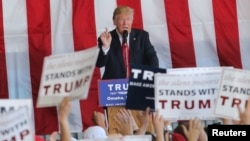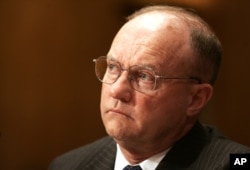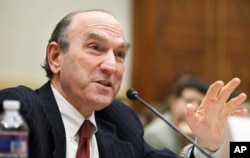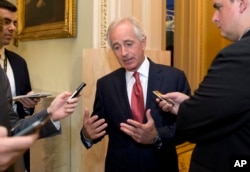Donald Trump’s unorthodox foreign policy views could dramatically affect the United States’ standing around the world if he's elected president in the fall.
But a group of former Republican administration officials and academics may have more impact. They are weighing the consequences of his policies for the Republican Party and whether they would join his administration.
Some elements of the Republican foreign policy establishment pushed back against Trump’s views earlier in the campaign season and after his April foreign policy speech in Washington.
Those concerns intensified after the unexpectedly quick resolution of the Republican nomination process, when Trump’s resounding win in the Indiana primary knocked Texas Senator Ted Cruz and Ohio Governor John Kasich out of the race.
Establishment support
Now the establishment must decide whether it will support a nominee whose foreign policy lacks definition and direction.
“What is his foreign policy? Where will this guy go?” retired Colonel Lawrence Wilkerson pictured Republican policymakers asking.
Wilkerson served as then-Secretary of State Colin Powell’s chief of staff during the lead-up to the 2003 Iraq War and has been highly critical of the Bush administration’s decision-making process in that war.
He agrees with Trump’s assertion that the Iraq invasion was a disastrous mistake for the United States but worries about Trump’s decisiveness.
“Will he be so inexperienced when he walks through that Oval Office door that the director of the CIA to the director of national intelligence to the secretary of state, you name it, secretary of defense will capture him and the next four years will be him bouncing off the walls trying to decide which one of the bureaucracies to support with his point of view?” he said.
Building criticism
Trump routinely cites his business experience as a skill set that can transfer into the realm of diplomatic negotiations and calls for an America-first approach to foreign relations.
That approach could be attractive to Americans, according to a Pew Research poll released this week. It found 57 percent of Americans are wary of global involvement, saying the United States should deal with its own problems and let other countries deal with their problems as best as they can.
“I do not believe there’s an analogy here between a business deal and a negotiation on behalf of a country where national security is at stake,” says Elliott Abrams, senior fellow for Middle Eastern studies at the Council on Foreign Relations and deputy national security adviser in the George W. Bush administration.
“He has no appreciation whatsoever of the importance of allies and alliances — all he does is insult them all the time and say they’re not doing enough, and it worries many of the allies in Asia and the Middle East and Europe," he added.
Over a hundred leading national security and foreign policy officials, many of whom held posts in previous Republican administrations, signed an open letter earlier in the campaign season saying they would be unable to support Trump as the nominee, calling “his vision of American influence and power in the world wildly inconsistent and unmoored in principle.”
“I don’t think he has a coherent foreign policy. It’s mostly slogans,” says Abrams.
Trump’s campaign team reportedly reached out to a number of establishment foreign policy and national security experts in early April, with little success. But the now-settled reality of a Trump nomination may significantly alter those calculations.
Abrams says the foreign policy advisers who end up joining the Trump campaign will have ways of justifying their decision.
“They want jobs, they want access. In other cases, they are optimists and think the world will teach him lessons,” he said. “They think that no president can do whatever he wants to do. There’s the Pentagon, there’s Congress to deal with.”
General election calculations
Abrams says there will be two key decision points. “What if his campaign reaches out to you? And then the next test — well, what if he wins?”
If Trump wins, the decision will get tougher.
“Then you can say to yourself,” said Abrams, “ 'I need to do it for the country.' It isn’t anymore about helping him win the election; we only have one president at a time.”
That argument will be especially attractive if Trump chooses centrist secretaries of state and defense who can appeal to specialists seeking to provide moderating influence on Trump’s views.
Trump has shown signs of moderating his language to adapt to a general election strategy that will appeal to a broad array of American voters. If he can do the same with his views on foreign policy, he may be able to convince more members of the foreign policy establishment.
Senate Foreign Relations Committee Chairman Bob Corker, who has declined to endorse Trump, talked with the candidate after his foreign policy speech. The senator told reporters last week, “I think his campaign, like anybody who hasn’t been in the public arena before, is evolving.”
The man who touts the art of the deal may then become the candidate for the art of the compromise.







